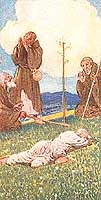 The
Glastonbury Thorn The
Glastonbury Thorn
Like the Shroud of Turin, the
Holy Thorn of Glastonbury is surrounded by sacred legend and symbolism. The Glastonbury thorn
legend ties in Christ's death as well as the celebration of his birth.
In Christian mythology Joseph of Arimathea carried the cup used by Jesus
at his last supper to Britain. The legend goes that soon after the death of Christ, Joseph of Arimathea
came to Britain to spread the message of Christianity. When he traveled
there from the Holy Land he brought with him his staff.
Exhausted by his journey, he rested at Weary-All Hill not far from the
Tor . In doing so, he pushed his staff into
the ground beside him. When he awoke, he found that the staff had taken
root and begun to grow and blossom. It is said he left it there and it
has flowered every Christmas and every spring . It is also said that a
puritan trying to cut down the tree was blinded by a splinter of the
wood before he could do so. The original thorn did eventually die but
not before many cuttings had been taken. It is one of these very
cuttings which is in the grounds of Glastonbury Abbey today.
It is proposed to give greater prominence in future Glastonbury
Pilgrimages to the significance of the thorn in Christian imagery.
For the Thorn not only
reminds us of "the Man of Sorrows, acquainted with grief" who
died for the sins of man on Calvary on the first Good Friday; it also
serves to help us remember that Christians are called upon to bear their
sufferings in this world cheerfully and positively remembering the Son
of God who suffered willingly "for us men and for our
salvation".
St Paul, too, described one
of the many sufferings which he had to endure as a thorn in the
flesh. In his Second Letter to the Corinthians he says:
...there
was given me a thorn in in the flesh... to buffet me, lest I should be
exalted above measure. For this thing I besought the Lord thrice, that
it might depart from me. And he said unto me "My grace is
sufficient for thee: for my strength is made perfect in weakness"
2 Corinthians 12: 7--9.
|